【每日词汇】英语中吃的表达方法
英语中不同的吃的用法
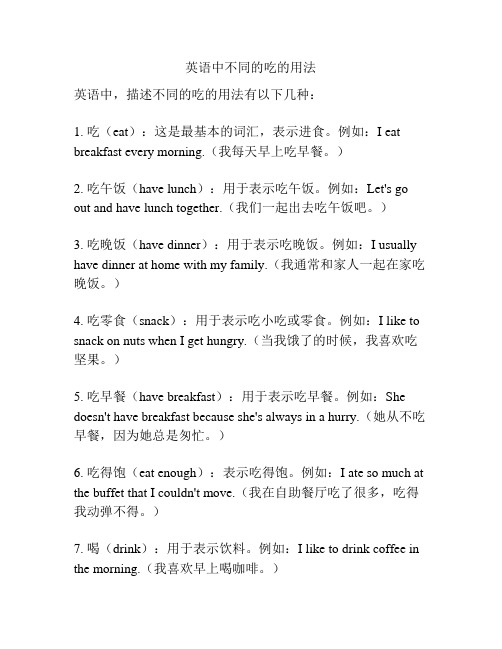
英语中不同的吃的用法英语中,描述不同的吃的用法有以下几种:1. 吃(eat):这是最基本的词汇,表示进食。
例如:I eat breakfast every morning.(我每天早上吃早餐。
)2. 吃午饭(have lunch):用于表示吃午饭。
例如:Let's go out and have lunch together.(我们一起出去吃午饭吧。
)3. 吃晚饭(have dinner):用于表示吃晚饭。
例如:I usually have dinner at home with my family.(我通常和家人一起在家吃晚饭。
)4. 吃零食(snack):用于表示吃小吃或零食。
例如:I like to snack on nuts when I get hungry.(当我饿了的时候,我喜欢吃坚果。
)5. 吃早餐(have breakfast):用于表示吃早餐。
例如:She doesn't have breakfast because she's always in a hurry.(她从不吃早餐,因为她总是匆忙。
)6. 吃得饱(eat enough):表示吃得饱。
例如:I ate so much at the buffet that I couldn't move.(我在自助餐厅吃了很多,吃得我动弹不得。
)7. 喝(drink):用于表示饮料。
例如:I like to drink coffee in the morning.(我喜欢早上喝咖啡。
)8. 尝试(try):用于表示尝试新的食物或菜肴。
例如:I want to try the local cuisine when I travel to a new place.(当我去一个新地方旅行时,我想尝试当地的美食。
)9. 品尝(taste):用于表示细细品尝食物的味道。
例如:The chef asked me to taste the sauce and give my opinion.(厨师让我品尝酱汁并给出意见。
吃的英文——精选推荐

吃的英⽂ 说到吃的英⽂,我们都知道是eat,eat这个单词在我们⽇常⽣活中的使⽤频率⾮常⾼。
下⾯是店铺为你整理的吃的英⽂,希望⼤家喜欢! 吃的英⽂ eat; have one's meals 关于吃的英⽂短语 吃早餐 have breakfast ; at breakfast ; lunch ; supper 吃早饭 have breakfast ; eat breakfast ; BREAKFAST ; lunch 请吃 Please eat ; help oneself to ; Invitation to Lunch ; Dinner Inviting 吃⾷物 eat food ; eatting food ; muckamuck 就吃 Ate 吃⽉饼 eat moon cakes ; Eating moon cakes ⼤吃 bulgota ; eat quickly ; engorge ; gobble 吃⼲饭 Eat cooked rice 到处吃 Serious Eats eat常见⽤法 vt.& vi.吃,喝; vi.(⾷物)吃起来感到; 咬; (⼈)感到苦恼(或烦恼); 侵蚀,腐蚀 vt.(如酸)腐蚀; 吃完; 吃得使; 侵蚀成 1. It makes sense to eat a reasonably balanced diet when slimming. 在减肥过程中保持饮⾷的营养相对均衡是明智的。
2. Jovial ladies chivvy you into ordering more than you can eat! 热情的⼥招待会⼀再推荐,最后点的餐多到吃不下! 3. Because you're not burning calories, everything you eat turns to fat. 由于没有消耗卡路⾥,你吃的所有东西都会变成脂肪。
人教pep版四年级英语上册单词

【目录】一、概述二、四年级上册英语单词列表三、四年级上册英语单词学习方法四、四年级上册英语单词学习建议五、结语【正文】一、概述四年级上册是学生学习英语的重要阶段,英语单词作为语言学习的基础,对于学生的语言能力和表达能力起着至关重要的作用。
在人教pep版四年级英语上册中,有许多重要的单词需要学生掌握。
本文将列举四年级上册的英语单词列表,并提供学习方法和建议,帮助学生更好地掌握这些单词。
二、四年级上册英语单词列表以下是人教pep版四年级英语上册的单词列表:1. apple - 苹果2. orange - 橙子3. banana - 香蕉4. cake - 蛋糕5. bread - 面包6. milk - 牛奶7. water - 水8. juice - 果汁9. egg - 鸡蛋10. rice - 米饭11. beef - 牛肉12. pork - 猪肉13. chicken - 鸡肉14. fish - 鱼15. cabbage - 卷心菜16. carrot - 胡萝卜17. tomato - 西红柿18. potato - 土豆19. cucumber - 黄瓜20. onion - 洋葱以上是四年级上册中常见的食物单词,学生需要熟记这些单词,并掌握其正确的发音和用法。
三、四年级上册英语单词学习方法学生可以通过以下方法来学习四年级上册的英语单词:1. 制作单词卡片:将每个单词和其对应的图片或中文意思制作成卡片,方便学生记忆和复习。
2. 听写和朗读:让学生多次听写和朗读单词,加深记忆并提高发音准确性。
3. 练习造句:引导学生运用所学单词造句,加深对单词的理解和运用能力。
4. 小组合作:组织学生进行小组合作学习,互相纠正发音和用法,促进学习效果。
5. 多媒体辅助:利用多媒体资源,如英语歌曲、视瓶等,帮助学生形象记忆单词。
四、四年级上册英语单词学习建议除了以上的学习方法外,老师和家长还可以给予学生以下学习建议,帮助他们更好地掌握四年级上册的英语单词:1. 每日坚持:每天花一定时间复习和记忆单词,保持学习的连续性和稳定性。
每天一个英语知识!

每天一个英语知识!#聚优铭品-每日单词#八月二号主题:这些傻傻分不清楚的单词啊! 1.quite 相当;quiet 安静地 2.angel 天使;angle 角度 3.dairy 牛奶厂;diary 日记4.principal 校长, 主要的;principle 原则5.sweet 甜的;sweat 汗水6.chicken 鸡;kitchen 厨房7.crow 乌鸦;crown 王冠;clown 小丑;cow 牛看到这些单词,是不是眼睛都花了,其实要区分他们也不难,放入特定的语境中,依靠对上下文的理解可以猜出单词的意思,另外呢,同学们自己开动脑筋,多记忆几遍,也可以编些有趣的小故事帮助记忆。
#聚优铭品-每日单词#八月四号主题:Bird 鸟英语中有许多关于bird的习惯用法和谚语,有些意思非常可爱,下面大家就来读读这几句,感觉一下英语的有趣之处吧。
1.He eats like a bird.他吃得很少。
【吃的和小鸟一样多,可见是非常少了】 2.A bird in the hand is worth two in the bush. [谚]双鸟在林不如一鸟在手。
3.We’re all early birds in my family because we live on a farm. 由于我们生活在农场,所以全家人都起得很早。
【早起的鸟儿有虫吃嘛】4.Birds of a feather flock together. [谚]物以类聚,人以群分。
5.A little bird told me.有人私下告诉我。
【不想透露对方信息,可以调皮的说是小鸟告诉我的】#聚优铭品-每日单词#八月五号主题:根据构词法记忆单词。
别看现在英语词汇已经超百万之多,但是英语的构词是有规律可寻的,掌握英语的词根词缀构词法,可以迅速突破英语词汇量,下面就请大家看几个例子吧。
1.bicycle自行车这个词是由bi+cycle组成,其中词根cycle是“循环、圆圈”的意思;前缀bi-表示“两个,双倍的”,那么两个圆圈就组成了自行车。
吃用英文怎么说

吃用英文怎么说吃是指用手或工具(筷子,叉子,勺子等)把食物送进口腔,经过牙齿咀嚼后下咽经食道管进入胃里,再由消化系统完成整个消化过程。
那么你知道吃用英语怎么说吗?下面来学习一下吧。
吃英语说法1:eat吃英语说法2:have one's meals吃的英语例句:我其实并没有注意到自己在吃什么。
I didn't really notice what I was eating.你吃过晚饭了吗?Have you had your supper?只要不吃得太多,你可以吃任何东西。
You may eat anything, so long as you don't eat too much.我怎么吃都不胖。
I could eat what I liked without getting fat.偷吃而不被人发现很有趣。
It is fun eating by stealth without being found.你隔多久就在外面吃一次饭?How often do you eat out?过了一小会儿,他们坐下来吃东西。
A short time later they sat down to eat.你吃糖果、蛋糕或甜点吗?Do you eat sweets, cakes or sugary snacks?他已经习惯在外面吃饭了。
He is used to eating out all the time.我一吃完晚饭就来这里了。
I came here immediately after having my supper.还能吃海鲜和椰子,我们想吃多少就吃多少。
And we can eat seafood and coconuts as much as we want.你所吃的要按分两吃,每日二十舍客勒;按时而吃。
Weigh out twenty shekels of food to eat each day and eat it at set times.蛇吃蟾蜍,蟾蜍吃昆虫,昆虫吃绿叶。
英语中吃的各种表达

英语中吃的各种表达Eating in English: A Diverse and Colorful Vocabulary Journey.In the vast and intricate landscape of English vocabulary, the subject of "eating" holds a particularly rich and varied territory. From the everyday casual expressions to the formal and culture-specific terms, English provides us with an array of words and phrases to describe the diverse acts, processes, and experiences surrounding food and eating. This article delves into the various expressions related to eating in English, exploring their origins, meanings, and cultural significance.Let's start with the most basic and fundamental verb: "to eat." This simple yet versatile word serves as the foundation for many other expressions related to eating. "I ate my lunch at school" is a straightforward statement, yet it encapsulates the essence of consuming food. However, English offers a plethora of alternatives to "eat" that canbe used to convey a more specific or nuanced meaning.For instance, "to dine" is a more formal term for eating a meal, often associated with social occasions or special events. "We dined at the finest restaurant in the city" suggests a level of elegance and sophistication. Similarly, "to sup" refers to having a light evening meal, often used in historical or literary contexts.When describing the quantity or manner of eating, English has an equally robust vocabulary. "To devour" implies eating with great hunger or enthusiasm, as in "She devoured the entire pizza in one sitting." On the other hand, "to nibble" suggests eating in small, dainty bites, often associated with delicacy or refinement.The English language also offers a range of verbs that describe the specific type of food being consumed. "To munch" is often used to describe eating something crunchy or solid, like a sandwich or apple. "She munched on her sandwich as she walked to work." Conversely, "to sip" is associated with drinking liquids slowly and carefully, asin "He sipped his coffee while reading the newspaper."Moving beyond verbs, English has a wealth of nouns and adjectives related to eating. "Meal" is a general term for any of the main eating occasions of the day, such as breakfast, lunch, or dinner. However, there are also more specific terms like "brunch" (a combination of breakfast and lunch) and "supper" (an evening meal, often used in British English).Adjectives related to eating can describe the quality, taste, or manner of food consumption. "Delicious" and "tasty" are common adjectives used to describe food that is pleasing to the palate. "Hearty" describes food that is substantial and filling, while "light" suggests a meal that is not heavy or indulgent.Phrases and idioms related to eating also play an important role in English conversation. "Eat your heart out" is an expression used to tease someone who is jealous or envious, while "eat humble pie" refers to apologizing or admitting one's mistakes. These idioms add color and nuanceto our language, allowing us to express complex emotions and situations in a concise and memorable way.Cultural references and historical context also play a significant role in English eating vocabulary. "High tea"is a traditional British afternoon meal that typically includes tea, sandwiches, and pastries. "All-you-can-eat" buffets are a modern-day phenomenon, originating from Japanese cuisine, that allows diners to eat as much as they want for a fixed price.In conclusion, the English language offers a vast and varied vocabulary to describe the acts, processes, and experiences surrounding food and eating. From verbs like "to dine" and "to munch" to nouns like "meal" and "supper," and from adjectives like "delicious" and "hearty" to phrases and idioms like "eat your heart out" and "high tea," English provides us with a rich and diverse set of tools to express our thoughts and feelings about food and eating. Whether we are describing a casual lunch with friends or a formal dinner party, English has the rightword or phrase to convey our meaning precisely and colorfully.。
E英语词汇
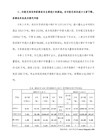
托福词汇:西安10种著名小吃的英语说法

托福词汇:西安10种著名小吃的英语说法托福词汇:西安10种著名小吃的英语说法西安的小吃真可谓是名扬天下,羊肉泡馍、肉夹馍、凉皮等都是家喻户晓的美味。
下面是小编为您收集整理的西安10种著名小吃的英语说法,欢迎阅读!托福词汇:西安10种著名小吃的英语说法羊肉泡馍01. Flatbread in mutton soup (yangrou paomo) –Yangrou paomo is the most iconic [标志性的] dish in the Xi’an foodscape. The ritual [例行公事] before eating a paomo – tearing the bread into small pieces yourself before letting the chef turn it into a stew [炖的食物] – is as enjoyable as the dish itself.带有汤汁的饭菜通常用in + 汤汁这个公式来表达,如红烧肉就是diced pork stewed in brown sauce。
肉夹馍02. Xi’an meat burger (roujiamo) –Roujiamo is the city’s favorite burger. A delicious roujiamo is composed of [由……组成] two key elements – juicy shredded [切成碎片的] braised pork [炖猪肉] and a crispy baked bread.肉夹馍其实是馍夹肉*_*,但不管怎样,肉夹馍和西方的汉堡包很类似,只不过肉夹馍用的是饼,汉堡包用的是面包。
顺便说一下,驴肉火烧可以翻译为donkey burger。
凉皮03. Cold noodles (liangpi) – Rice noodles are cooked, cooled and thinly sliced. The noodles are often served in a sauce made of chili oil [辣椒油], pepper powder, vinegar and diced garlic [切成丁的大蒜]. Then it’s garnished with [配有] bean sprouts [豆芽] and sliced cucumber [黄瓜].提到noodle的时候,通常都是复数noodles,因为我们不可能就吃一根吧!方便面叫instant noodles。
广州版小学英语五年级上册同步讲义:Unit 8 Let’s have both

Unit 8 Let’s have bothFocus PointsLet’s Talk1.Talk about what do you want to have for main course.Warming Up一.听写__________________________________________________________________________________ __________________________________________________________________________________ __________________________________________________________________________________ __________________________________________________________________________________ __________________________________________________________________________________ __________________________________________________________________________________ 二.单词及短语1.两者都____________________________2. 应该___________________________3.米;饭____________________________4. 饺子___________________________5.面条______________________________6. 欣赏;喜欢_____________________7.面包______________________________8. 三文治_________________________9.炸薯条____________________________ 10.担心___________________________ 11.第一道菜__________________________ 12.西红柿_________________________ 13.鸡蛋______________________________ 14.汤_____________________________ 15.主要的____________________________ 16.每个人;所有人_________________ 17.开始______________________________ 18.巧克力_________________________ 19.希望______________________________ 20.马铃薯_________________________ 21.甜品______________________________ 22.蔬菜___________________________ 23.肉________________________________ 24.主菜____________________________ 25.西红柿蛋花汤______________________ 26.你多滤了_______________________ 27.参加她的派对______________________ 28.享受食物_______________________ 29.两者皆有__________________________ 30.头盘是_________________________ 31.主菜是____________________________ 32.甜点是_________________________ 33.肉煮蔬菜__________________________ 34.好主意_________________________ 35.巧克力蛋糕________________________ 36.开始做饭_______________________ 37.爱吃饭____________________________ 38.喝汤___________________________ 三.课文内容根据提示把句子补充完整。
英语对吃的表达方法

英语对吃的表达方法英语对吃的表达方法一看到"吃",人们自然而然想到的英语对应词就是"eat",但是,这个简单的"吃"的`意义绝不是一个"eat"就能完全表达的。
除了eat之外,还应该根据不同的情景和意义给予恰当的表达,以下是店铺整理的英语对吃的表达方法,供大家参考借鉴,希望可以帮助到有需要的朋友。
1.译作take或have。
The patient can't take food yet.病人还不能吃饭。
We are having dinner now.我们现在正在吃晚饭。
2.译作dine,feed,taste,touch,graze等词。
She invites me to dine with her tomorrow.她邀请我明天和她一起吃饭。
Have you fed yet?你吃饭了吗?He hasn't touched /tasted food for two days.他两天没吃东西了。
The horses were grazing quietly in the field.马群正在田野里静静地吃草。
3.译作like,love,prefer,enjoy,care for, be fond of等。
Would you like `ice-cream`?你想吃冰淇淋吗?She loves bananas.她爱吃香蕉。
Southerners prefer rice while northerners prefer noodles.南方人喜欢吃米饭而北方人喜欢吃面条。
He is enjoying his dinner.他正津津有味地吃晚饭。
Tom doesn't care for meat.汤姆不怎么喜欢吃肉。
Ants are fond of sweet food.蚂蚁喜欢吃甜食。
4.译作feed on,live on等短语动词。
英语中不同的吃的用法

英语中不同的吃的用法在英语中,有很多词汇可以用来描述吃的行为或者各种吃的东西。
以下是一些常见的用法和词汇:1.吃饭:have a meal、 eat a meal、 dine、 have a bite、grab a bite;例如:I'm going to have dinner at my friend's house tonight.(今晚我要去朋友家吃饭。
)2.吃早餐:have breakfast、 eat breakfast;例如:I usually have breakfast at 7 a.m.(我通常在早上7点吃早餐。
)3.吃午餐:have lunch、 eat lunch;例如:Let's eat lunch together at the café.(我们一起在咖啡馆吃午饭吧。
)4.吃晚餐:have dinner、 eat dinner;例如:We always eat dinner as a family.(我们一家人都会一起吃晚饭。
)5.吃零食:have a snack、 eat a snack;例如:I like to have a snack in the afternoon.(我喜欢在下午吃点小吃。
)6.吃甜点:have dessert、 eat dessert;例如:Don't forget to save some space for dessert.(别忘了为甜点留点空间。
)7.吃水果:have fruit、 eat fruit;例如:I try to eat fruit every day for a healthy diet.(我为了健康饮食每天都会吃水果。
)8.吃雪糕:have ice cream、 eat ice cream;例如:Let's go out for ice cream after dinner.(晚饭后我们一起去吃冰淇淋吧。
初中英语基本词汇语法解析以字母d开头的单词
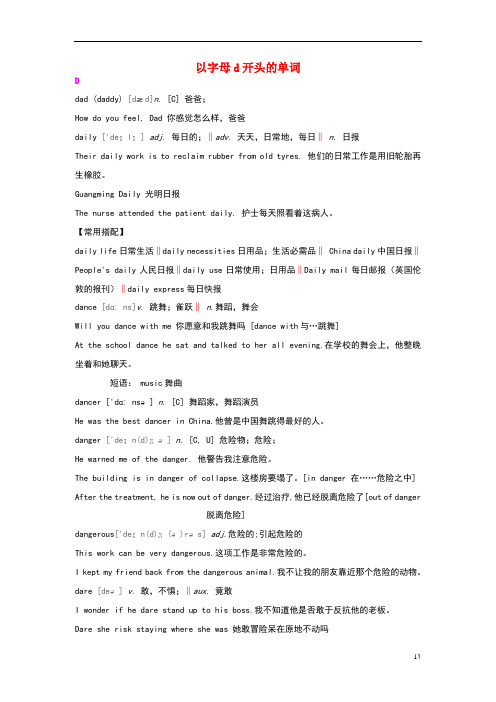
以字母d开头的单词Ddad (daddy) [dæd]n. [C] 爸爸;How do you feel, Dad 你感觉怎么样,爸爸daily ['deɪlɪ]adj.每日的;‖adv.天天,日常地,每日‖ n.日报Their daily work is to reclaim rubber from old tyres. 他们的日常工作是用旧轮胎再生橡胶。
Guangming Daily 光明日报The nurse attended the patient daily. 护士每天照看着这病人。
【常用搭配】daily life日常生活‖daily necessities日用品;生活必需品‖ China daily中国日报‖People's daily人民日报‖daily use日常使用;日用品‖Daily mail每日邮报(英国伦敦的报刊)‖daily express每日快报dance [dɑːns]v. 跳舞;雀跃‖ n.舞蹈,舞会Will you dance with me 你愿意和我跳舞吗 [dance with与…跳舞]At the school dance he sat and talked to her all evening.在学校的舞会上,他整晚坐着和她聊天。
短语: music舞曲dancer ['dɑːnsə] n. [C] 舞蹈家,舞蹈演员He was the best dancer in China.他曾是中国舞跳得最好的人。
danger ['deɪn(d)ʒə]n. [C, U] 危险物;危险;He warned me of the danger. 他警告我注意危险。
The building is in danger of collapse.这楼房要塌了。
[in danger 在……危险之中] After the treatment, he is now out of danger.经过治疗,他已经脱离危险了[out of danger脱离危险]dangerous['deɪn(d)ʒ(ə)rəs]adj.危险的;引起危险的This work can be very dangerous.这项工作是非常危险的。
【音频】40篇短文识记高中英语3500词(3-4)(含词汇解析及练习)

重点词汇解析:1.be fond of 爱好,喜欢,相关短语:be fond of doing 喜欢做...be never fond of 从来不爱做...例句:It is human nature that all of us should be fond of beauty. Everybody was born with a heart for beauty.我们每一个人都应该是喜爱美的,这是人的本性。
爱美之心人皆有之。
2. ever since 从那时到现在例句:I have distrusted her ever since she cheated me. 自从她骗我以后,我就不信任她了。
3. graduatevt. 授予…学位;分等级;标上刻度vi. 毕业;渐变n. 研究生;毕业生adj. 毕业的;研究生的相关短语:graduate from 从...毕业the graduate 毕业生graduate student 研究生graduate school 研究所graduate certificate 毕业证书graduate degree 研究生学位相关词汇:graduation n. 毕业;毕业典礼;刻度,分度;分等级graduated adj. 累进的;毕了业的 v. 使毕业;使…升级4. determinevt.& vi.(使)下决心,(使)做出决定;vt.决定,确定;判定,判决;使决定;限定vi.[主用于法律]了结,终止,结束;相关短语:determine to do /doing sth. 下决心做be determined to do sth. 下决心做resolve to do sth. 下决心做make up one’s mind 下决心做相关词汇:determinate adj.限定的,确定的determined adj. 坚定的;毅然的;确定的v.(使)下决心,(使)做出决定( determine的过去式和过去分词);决定;确定;使决定determination n. 决心;决定,确定5. organizevt. 组织;使有系统化;给予生机;组织成立工会等vi. 组织起来;成立组织相关词汇:organization n. 组织;机构;体制;团体organizational adj. 组织的;编制的organizer n. 组织者;承办单位organized adj.有组织的,有条理的;v.组织(过去式)6. temple n.庙,寺;太阳穴,鬓角例句:Threads of silver ran through his beard and the hair a t his temples.缕缕银丝已爬上了他的胡须和两鬓的头发。
每日积累 背三句 关于 吃 的一些英文

每日积累背三句关于吃的一些英文1.饭英文单词:rice双语例句:我喜欢吃米饭。
I like to eat rice.2.面包英文单词:bread双语例句:早餐我通常吃面包。
I usually eat bread for breakfast.3.汉堡包英文单词:hamburger双语例句:我今天中午想吃一个汉堡包。
I want to eat a hamburger for lunch today.4.薯条英文单词:fries双语例句:我们一起分享一份薯条吧。
Let's share a plate of fries together.5.披萨英文单词:pizza双语例句:我最喜欢的披萨口味是四种芝士。
My favorite pizza flavor is four cheese.6.面条英文单词:noodles双语例句:晚餐我想吃炒面条。
I want to eat fried noodles for dinner.7.炸鸡英文单词:fried chicken双语例句:周末我会做炸鸡吃。
I will make fried chicken to eat on the weekend.8.鱼英文单词:fish双语例句:我们今晚准备烤鱼。
We are going to have grilled fish tonight.9.蔬菜英文单词:vegetables双语例句:我们家常吃新鲜的蔬菜。
We often eat fresh vegetables at home.10.水果英文单词:fruit双语例句:夏天我喜欢吃西瓜。
I like to eat watermelon in summer.11.牛排英文单词:steak双语例句:我妈妈会煎一块好吃的牛排。
My mom can cook a delicious steak.12.汤英文单词:soup双语例句:冬天我喜欢喝热汤。
I like to drink hot soup in winter.13.冰淇淋英文单词:ice cream双语例句:天气那么热,我们一起吃冰淇淋吧。
关于吃的英文句子
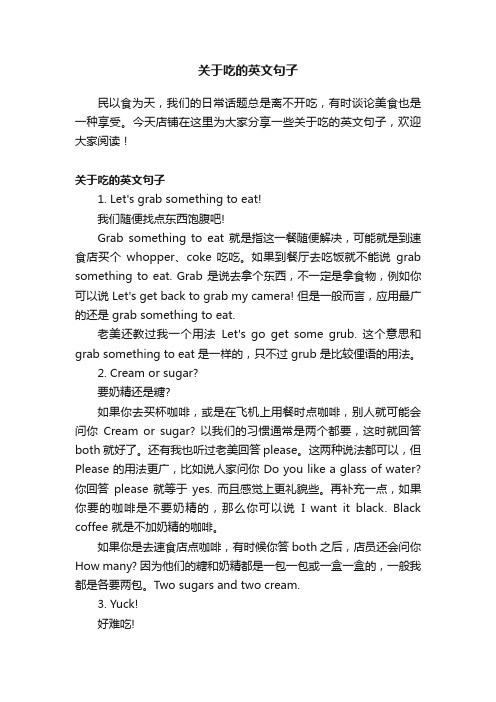
关于吃的英文句子民以食为天,我们的日常话题总是离不开吃,有时谈论美食也是一种享受。
今天店铺在这里为大家分享一些关于吃的英文句子,欢迎大家阅读!关于吃的英文句子1. Let's grab something to eat!我们随便找点东西饱腹吧!Grab something to eat 就是指这一餐随便解决,可能就是到速食店买个whopper、coke 吃吃。
如果到餐厅去吃饭就不能说grab something to eat. Grab 是说去拿个东西,不一定是拿食物,例如你可以说 Let's get back to grab my camera! 但是一般而言,应用最广的还是 grab something to eat.老美还教过我一个用法Let's go get some grub. 这个意思和grab something to eat 是一样的,只不过 grub 是比较俚语的用法。
2. Cream or sugar?要奶精还是糖?如果你去买杯咖啡,或是在飞机上用餐时点咖啡,别人就可能会问你Cream or sugar? 以我们的习惯通常是两个都要,这时就回答both 就好了。
还有我也听过老美回答 please。
这两种说法都可以,但Please 的用法更广,比如说人家问你 Do you like a glass of water? 你回答please 就等于yes. 而且感觉上更礼貌些。
再补充一点,如果你要的咖啡是不要奶精的,那么你可以说I want it black. Black coffee 就是不加奶精的咖啡。
如果你是去速食店点咖啡,有时候你答 both 之后,店员还会问你How many? 因为他们的糖和奶精都是一包一包或一盒一盒的,一般我都是各要两包。
Two sugars and two cream.3. Yuck!好难吃!吃到很难吃的东西,第一个反应就是 yuck! 或是 It's yucky. 记得说这个 yuck 要拖的长长的,让它读起来像是 yuuuuuuuck 听起来才会像。
英语百科词汇
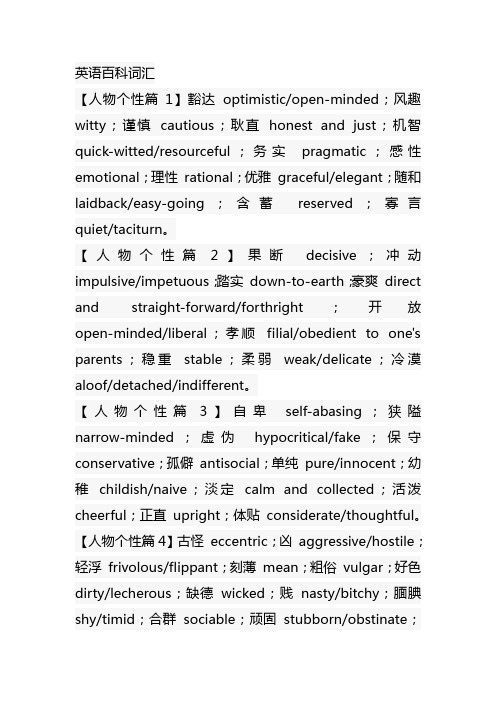
英语百科词汇【人物个性篇1】豁达 optimistic/open-minded;风趣witty;谨慎cautious;耿直honest and just;机智quick-witted/resourceful;务实pragmatic;感性emotional;理性 rational;优雅 graceful/elegant;随和laidback/easy-going;含蓄reserved;寡言quiet/taciturn。
【人物个性篇2】果断decisive;冲动impulsive/impetuous;踏实 down-to-earth;豪爽 direct and straight-forward/forthright;开放open-minded/liberal;孝顺filial/obedient to one's parents;稳重stable;柔弱weak/delicate;冷漠aloof/detached/indifferent。
【人物个性篇3】自卑 self-abasing;狭隘 narrow-minded;虚伪hypocritical/fake;保守conservative;孤僻antisocial;单纯 pure/innocent;幼稚 childish/naive;淡定 calm and collected;活泼 cheerful;正直 upright;体贴 considerate/thoughtful。
【人物个性篇4】古怪 eccentric;凶 aggressive/hostile;轻浮 frivolous/flippant;刻薄 mean;粗俗 vulgar;好色 dirty/lecherous;缺德 wicked;贱 nasty/bitchy;腼腆 shy/timid;合群 sociable;顽固 stubborn/obstinate;肤浅 superficial/shallow;神经质 neurotic。
中考英语一轮复习E开头词汇讲义

最新初中教学设计教案知识点和真题汇总中考一轮复习 E 开头词汇(讲义)❤❤以字母 E 开头的单词each /iːtʃ/determiner, pronoun. 各自的;每个的each parent, each week/timeeach other (pron.) =one another 互相,彼此adv. 每人;每个;每件We have decided to each sell five things that we no longer use. ear /ɪə/ n. 耳朵;耳状物;听力;听觉have good ears 听力灵敏earring _early /'ə:li/adj. 早的early bus in early spring 在早春The early bird catches theworm.adv. 早地get up earlyearth /ɜːθ/ n. 地球;土;泥;大地earthquake 地震earthworm 蚯蚓east /iːst/n. 东方;东部in the east of/ to the east of/on the east ofadj. 东方的;朝东的;从东方来的east windadv. 在东方;向东方;从东方go east/westeasy /'iːzɪ/ adj. 容易的;不担心的,舒适的adv.take it easyeat /iːt/ v. ( , )吃eat up 吃光Come on, eat it up, there’s a good girl.eat out 出去吃饭edge /edʒ/ n.on the edge of a cliff at the water’s edgeeducate /ˈedʒukeɪt/ v. 教育an educated womaneducator /ˈedʒukeɪtə(r)/ n. 教育工作者;教师education/edjʊ'keɪʃ(ə)n/ n. 教育;培养further education 深造educational adj. 教育的;有教育意义的 educational workeffort /'efət/ n. 努力;艰难的尝试尽力做某事effect /ɪˈfekt/ n. 影响;效果cause and effectegg /eɡ/n. 蛋;卵eight /eit/ num. 八/eitθ/ num. 第八/'eiti/ num. 八十十八either /'aiðə/determiner. (两物或两人中的)任一的,各一的,每一的conj. 或是,或者;要么(表示非此即彼)pron. (两者中的)任一个adv. (仅用于否定句) 也either / both / neither / all / none / anyyou I right.you I right .要么你对,要么我对。
shit在口语中的用法种种_爱词霸沙龙-英语学习-交友论坛
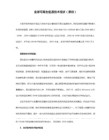
Allan Li[图]
[图]
等 级:中级词友
积 分:2443分
专家分:64分
[图][图]
[图]
看我其他帖子
看我的日志
主题:hit在口语中的用法种种
收藏本贴|好友分享|推广拿分
用户名:
密 码:
忘记密码?
下次自动登录
还没有注册?
[图]
爱词霸推荐
[图]·话题:春晚最“牛”的节目
·趣味:不可思议的职场故事
·《非诚勿扰》双语征婚启事
·测试:你能守住天长地久吗
·跟美国人聊天要牢记“三大纪律八项注意”
·大话英文:《非诚勿扰》征婚启事搞笑翻译
·如何提高英语听说 ·冬日免费英语早餐
这样的词还有很多,比如
shit-eatting grin表示满意的表情,心满意足的样子
例如go ahead,sit there,with that shit-eatting grin on your face
shit for brain傻子
what's old shit for brians trying to say?那些老蠢驴在说什么?
《艾德华的私人频道》里那个女编辑对着她的boss说了一句"shithead,shitface"
《南方公园》里也有类似的话,仿佛shitface成了比较流行的脏话。
其实shitface是一句学生用语,表示醉酒。
这样的词还有:
shit-ass
说话不算数,I don't want anybody shit assing out of it在这件事儿上,谁也不许说话不算数。
- 1、下载文档前请自行甄别文档内容的完整性,平台不提供额外的编辑、内容补充、找答案等附加服务。
- 2、"仅部分预览"的文档,不可在线预览部分如存在完整性等问题,可反馈申请退款(可完整预览的文档不适用该条件!)。
- 3、如文档侵犯您的权益,请联系客服反馈,我们会尽快为您处理(人工客服工作时间:9:00-18:30)。
【每日词汇】英语中"吃"的表达方法
2014-10-26英语家园论坛英语家园
一看到“吃”,人们自然而然想到的英语对等词就是“eat”,但是,这个简单的“吃”的意义决不是一个“eat”就能完全表达的。
除了eat之外,还应该根据不
同的情景和意义给予恰当的表达。
常见的表达法如下:
1.译作take或have。
The patient can't take food yet.病人还不能吃饭。
We are having dinner now.我们现在正在吃晚饭。
2.译作dine,feed,taste,touch,graze等词。
She invites me to dine with her tomorrow.
她邀请我明天和她一起吃饭。
Have you fed yet?你吃饭了吗?
He hasn't touched/tasted food for two days.他两天没吃东西了。
The horses were grazing quietly in the field.
马群正在田野里静静地吃草。
3.译作like,love,prefer,enjoy,care for,be fond of等。
Would you like`ice-cream`?你想吃冰淇淋吗?
She loves bananas.她爱吃香蕉。
Southerners prefer rice while northerners prefer noodles.
南方人喜欢吃米饭而北方人喜欢吃面条。
He is enjoying his dinner.他正津津有味地吃晚饭。
Tom doesn't care for meat.汤姆不怎么喜欢吃肉。
Ants are fond of sweet food.蚂蚁喜欢吃甜食。
4.译作feed on,live on等短语动词。
Cattle feed chiefly on grass.牛主要靠吃草为生。
Monkeys live on wild fruit.猴子以吃野果为生。
5.译作某些介词短语。
It's time for lunch.该吃午饭了。
Please sit down at table.请坐下吃饭吧。
6.某些引申意义的“吃”,可根据具体意义用适当的词或词组表示。
You'd better not ask for trouble.你最好不要自讨苦吃。
He's always the first to bear hardships.
他总是吃苦在前。
The enemy troops suffered one defeat after another.
敌军连吃败仗。
This is a hard way to earn a living.这碗饭不容易吃。
A wise man does not fight when the odds are against him.
好汉不吃眼前亏。
Such a style is unpopular anywhere.这种作风到哪儿都吃不开。
Mechanical copying of anything foreign would be disastrous.
机械地照搬外国的东西要吃大亏的。
It may be too much for you to walk such a long way.
走这么长的路恐怕你吃不消。
A fall into the pit,a gain in your wit.吃一堑,长一智。
That's a thankless task.那是吃力不讨好的事。
Only if you can stand the hardest of hardships can you hope to rise in society.
吃得苦中苦,方为人上人。
She was so jealous that she wouldn't let her husband dance with anyone else.
她好吃醋,总不让丈夫跟其他人跳舞。
This kind of paper does not absorb ink.这种纸不吃墨。
